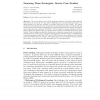Free Online Productivity Tools
i2Speak
i2Symbol
i2OCR
iTex2Img
iWeb2Print
iWeb2Shot
i2Type
iPdf2Split
iPdf2Merge
i2Bopomofo
i2Arabic
i2Style
i2Image
i2PDF
iLatex2Rtf
Sci2ools
ML
1998
ACM
1998
ACM
Learning Team Strategies: Soccer Case Studies
We use simulated soccer to study multiagent learning. Each team's players (agents) share action set and policy, but may behave di erently due to position-dependent inputs. All agents making up a team are rewarded or punished collectively in case of goals. We conduct simulations with varying team sizes, and compare several learning algorithms: TD-Q learning with linear neural networks (TD-Q), Probabilistic Incremental Program Evolution (PIPE), and a PIPE version that learns by coevolution (CO-PIPE). TD-Q is based on learning evaluation functions (EFs) mapping input/action pairs to expected reward. PIPE and CO-PIPE search policy space directly. They use adaptive probability distributions to synthesize programs that calculate action probabilities from current inputs. Our results show that linear TD-Q encounters several di culties in learning appropriate shared EFs. PIPE and CO-PIPE, however, do not depend on EFs and nd good policies faster and more reliably. This suggests that in som...
Linear Neural Networks | Machine Learning | ML 1998 | Policy Space | Probabilistic Incremental Program |
| Added | 22 Dec 2010 |
| Updated | 22 Dec 2010 |
| Type | Journal |
| Year | 1998 |
| Where | ML |
| Authors | Rafal Salustowicz, Marco Wiering, Jürgen Schmidhuber |
Comments (0)

